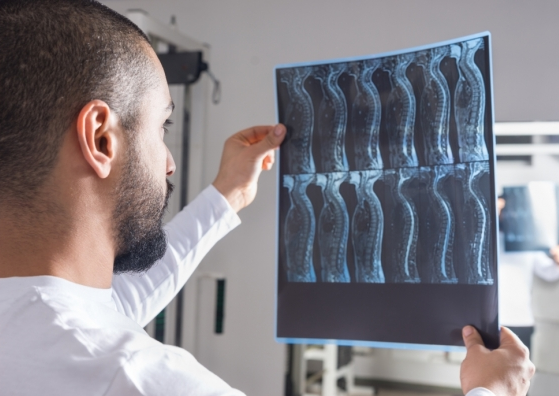When it comes to IMEs specifically for spinal cord injuries, it is essential to seek a qualified medical professional with specialized knowledge in this field.
In this comprehensive guide, we will explore the concept of Spinal Cord Injury IMEs, including their process, purpose, and what individuals can expect during these examinations.
We will also discuss the importance of selecting an expert for a fair evaluation and how Spinal Cord Injury IMEs factor into legal claims or cases.
By providing a thorough understanding of Spinal Cord Injury IMEs, this guide aims to empower individuals with the knowledge they need to navigate the process confidently and effectively.
Understanding Independent Medical Examinations (IMEs) for Spinal Cord Injuries
Independent Medical Examinations (IMEs) play a crucial role in the assessment and evaluation of spinal cord injuries. An IME involves a thorough examination conducted by a medical professional who is independent and impartial, meaning they are not involved in the ongoing treatment of the patient.
The purpose of an IME in the context of spinal cord injuries is to obtain an objective opinion regarding the nature, extent, and cause of the injury, as well as to assess the prognosis and the need for medical treatment or rehabilitation. It serves as a valuable tool in legal claims or cases related to spinal cord injuries.
IMEs are conducted by medical professionals who specialize in spinal cord injuries and possess in-depth knowledge and expertise in this specific area. This specialization ensures that the examiner is equipped to accurately evaluate the injury and provide an unbiased medical opinion.
It is crucial to seek out a qualified medical professional when scheduling a spinal cord injury IME. This ensures that the examiner has the necessary credentials and experience to conduct a comprehensive assessment and provide an informed medical opinion. By choosing a qualified expert, individuals can have confidence in the accuracy and credibility of the examination.
Overall, IMEs for spinal cord injuries are important in providing an independent, objective medical viewpoint. They assist in determining the nature and extent of the injury, evaluating the need for treatment or rehabilitation, and providing medical evidence in legal claims or cases. Seeking a qualified medical professional with specialized knowledge in spinal cord injuries is essential to ensure a thorough and reliable examination.
Selecting a Qualified Medical Professional for Spinal Cord Injury IME
When it comes to undergoing an Independent Medical Examination (IME) specifically for a spinal cord injury, it is vital to select a qualified medical professional with expertise in this field. The choice of the medical professional conducting the IME can significantly impact the outcome of the examination and subsequent legal proceedings.
To ensure the credibility and accuracy of the IME, it is crucial to consider the credentials and qualifications of the medical professional. Look for individuals who have specialized knowledge and experience in assessing and treating spinal cord injuries. This could include neurologists, neurosurgeons, orthopedic surgeons, or physiatrists, among others.
When selecting a qualified medical professional for a spinal cord injury IME, it is advisable to seek referrals from trusted sources such as primary care physicians, specialists, or reputable legal professionals. Additionally, conducting online research and reading reviews or testimonials can provide insights into the expertise and reputation of potential candidates.
It may also be helpful to contact relevant medical associations or organizations specializing in spinal cord injuries for recommendations or a list of qualified experts. These associations are often composed of professionals who are actively involved in the field and can provide valuable guidance in selecting the right medical professional for an IME.
Remember, choosing a medical professional with specialized knowledge in spinal cord injuries ensures that the IME is conducted accurately and comprehensively. Their expertise allows for a thorough examination and an objective assessment of the nature, extent, cause, and prognosis of the spinal cord injury.
Taking the time to carefully select a qualified medical professional for a spinal cord injury IME will contribute to the integrity and validity of the examination, helping individuals navigate their legal claims or cases more effectively.
The Process and Purpose of Spinal Cord Injury IMEs
Independent Medical Examinations (IMEs) for Spinal Cord Injuries follow a structured process to gather objective medical opinions related to the nature, extent, cause, prognosis, and treatment needs of the spinal cord injury. Understanding this process is crucial for individuals undergoing an IME.
Here is an overview of what to expect:
- Scheduling: Once the need for an IME is determined, the scheduling process begins. This involves coordinating appointments between the individual, their legal representative (if applicable), and the chosen medical professional.
- Medical Records Review: Prior to the IME, the medical professional conducting the examination will thoroughly review the individual’s medical records, including diagnostic tests, treatment history, and medical reports.
- Physical Examination: The IME usually involves a comprehensive physical examination specific to spinal cord injuries. The medical professional will assess sensory function, motor function, reflexes, range of motion, and any other relevant factors. They may also conduct imaging studies, such as X-rays or MRIs, to gather further information.
- Interview and History Taking: The medical professional may conduct an interview to gather additional information about the individual’s medical history, the circumstances of the injury, and any previous treatments or therapies received.
- Report Preparation: After the examination, the medical professional will prepare a detailed report documenting their findings, opinions, and conclusions. This report is a critical piece of evidence and may be used in legal proceedings or to support insurance claims.
The purpose of a Spinal Cord Injury IME is multifaceted.
It aims to:
- Assess the nature and extent of the spinal cord injury: The IME helps determine the severity of the injury, the specific areas of the spinal cord affected, and the impact on overall functioning.
- Determine the cause and prognosis: The medical professional will assess the cause of the spinal cord injury, whether it was a result of a traumatic incident or a medical condition. They will also provide insight into the individual’s prognosis, including potential recovery and long-term effects.
- Evaluate the need for medical treatment or rehabilitation: The IME helps determine the appropriate medical treatments, therapies, or rehabilitation needed to optimize the individual’s recovery and quality of life. This information can be crucial for healthcare providers, insurers, and legal professionals involved in the case.
Overall, Spinal Cord Injury IMEs play a vital role in objectively assessing the medical aspects of spinal cord injuries.
By following a structured and thorough process, these IMEs provide valuable information, supporting individuals with their legal claims or cases and facilitating appropriate medical care and rehabilitation.
What to Expect During a Spinal Cord Injury IME
During a Spinal Cord Injury IME, individuals can expect a thorough examination conducted by an independent medical professional who specializes in spinal cord injuries.
The purpose of this examination is to assess the nature and extent of the spinal cord injury, determine its cause and prognosis, and evaluate the need for medical treatment or rehabilitation.
The duration of the examination can vary depending on the complexity of the case, but it typically lasts between one to two hours. It is important to arrive on time and be prepared to provide a detailed medical history, including any previous spinal cord injuries or related medical conditions.
The independent medical professional may perform various diagnostic tests to gather information about the individual’s condition. These tests may include imaging studies such as X-rays, CT scans, or MRI scans to assess the structure of the spinal cord and surrounding tissues. Sensory examinations and motor function evaluations may be conducted to evaluate the individual’s sensory perception, muscle strength, and reflexes.
It is crucial to cooperate fully during the examination and provide honest and accurate responses to any questions asked by the medical professional.
This will ensure a comprehensive evaluation and an accurate assessment of the spinal cord injury.
Individuals may have concerns about the privacy and confidentiality of their medical information during the IME process. However, it is important to note that the medical professional conducting the examination is bound by strict confidentiality rules. The information obtained during the IME will only be shared with authorized parties, such as the individual’s legal representative or the court, as required for the legal claim or case.
Individuals undergoing a Spinal Cord Injury IME should expect a thorough evaluation of their condition by an expert medical professional.
By being well-prepared, providing accurate information, and actively participating in the examination process, individuals can contribute to a fair and comprehensive evaluation of their spinal cord injury.
Spinal Cord Injury IME in the Context of Legal Claims or Cases
Spinal cord injury IMEs play a crucial role in legal claims or cases related to such injuries. When pursuing a legal claim or case, obtaining an IME report can provide valuable medical evidence that can greatly impact the outcome.
The IME report serves as an objective medical opinion that assesses the nature and extent of the spinal cord injury. It not only helps determine the cause and prognosis of the injury but also evaluates the need for medical treatment or rehabilitation.
In the context of legal proceedings, the IME report can significantly influence the outcome of a case. Judges, juries, and insurance companies often rely on these reports to make informed decisions regarding liability, damages, and compensation. The report can provide an unbiased assessment of the injury, helping to establish the validity and severity of the claim.
To effectively prepare for a spinal cord injury IME in a legal setting, there are several key steps to consider:
- Gather all relevant medical records: Ensure that you have comprehensive medical records related to your spinal cord injury. These records should include diagnostic imaging, surgical procedures, and previous treatments received.
- Document your medical history: Prepare a detailed medical history, including the circumstances surrounding the injury, symptoms experienced, and any prior relevant medical conditions. Providing this information in a clear and concise manner will enable the examining medical professional to better understand your case.
- Consult with your legal counsel: Seek guidance from your legal counsel regarding the importance of the IME report in your specific legal claim or case. They can help you understand how the report may be used to support your arguments and provide valuable insights.
- Prepare for the IME appointment: Familiarize yourself with the IME process outlined in section III of this guide. Additionally, discuss any specific concerns or questions you may have with your legal counsel before the appointment.
- Be honest and forthcoming: During the IME, it is crucial to answer all questions truthfully and provide accurate information. Be thorough in describing your symptoms, limitations, and the impact the injury has had on your daily life. Honesty and transparency will strengthen the validity and credibility of your claim.
By effectively preparing for a spinal cord injury IME, you can maximize the chances of a fair evaluation of your case. The expert medical professional conducting the examination will rely on your collaboration and accurate information to provide an objective assessment. Working closely with your legal counsel and utilizing the information provided in this comprehensive guide will help you navigate the IME process confidently and effectively.
Conclusion
Understanding the role and importance of Independent Medical Examinations (IMEs) in spinal cord injury cases is crucial.
By selecting a qualified medical professional specializing in spinal cord injuries for an IME, individuals can ensure they receive expert guidance and insights.
The comprehensive guide provided in this article covers various aspects of Spinal Cord Injury IMEs, including their process, purpose, and what to expect during the examination.
It also highlights the significance of IMEs in the context of legal claims or cases, emphasizing the impact of the IME report on the outcome.
Following the guidance provided, individuals can navigate the Spinal Cord Injury IME process more confidently and effectively.
Further Considerations
Complexity of Spinal Cord Injuries
Spinal cord injuries are highly complex medical conditions, which can present unique challenges during an independent medical examination. Medical professionals conducting the examination need to have a thorough understanding of the anatomy and functionality of the spinal cord, as well as the specific implications of the injury.
Diagnostic Difficulties
Diagnosing and evaluating spinal cord injuries can be challenging, as symptoms may vary greatly depending on the location and severity of the injury. Independent medical examiners may face difficulties in accurately assessing the extent of the injury and its impact on the individual’s functionality and quality of life.
Functional Assessment
Assessing the functional limitations and disabilities resulting from a spinal cord injury requires a comprehensive examination that goes beyond traditional medical evaluations. Independent medical examiners must consider the individual’s abilities in activities of daily living, mobility, independence, and accessibility needs.
Rehabilitation and Long-Term Care Considerations
Spinal cord injuries often require extensive rehabilitation and long-term care to optimize recovery and manage the associated disabilities. Independent medical examinations must take into account the ongoing medical needs, potential complications, and future treatment options required for spinal cord injury patients.
Legal and Insurance Considerations
Independent medical examinations related to spinal cord injuries are often conducted in the context of legal claims or insurance assessments. Medical professionals conducting these examinations need to be familiar with the legal framework and their role in the process. They should be prepared to provide objective and impartial assessments while considering the legal implications of their findings.
FAQs (Frequently Asked Questions) About Spinal Cord Injury IMEs
How long does a Spinal Cord Injury IME usually take?
Answer: The duration of a Spinal Cord Injury IME can vary depending on several factors, including the complexity of the case and the extent of the evaluation required. It can range from a few hours to a full day.
What happens if I disagree with the findings of the Spinal Cord Injury IME?
Answer: If you disagree with the findings of the Spinal Cord Injury IME, you have the right to submit a rebuttal or seek a second opinion from another qualified medical professional. It is important to consult with your legal representative to explore your options.
Can I bring a family member or advocate with me to the Spinal Cord Injury IME?
Answer: In most cases, you are allowed to bring a family member or advocate with you to the Spinal Cord Injury IME. However, their role may be limited to providing emotional support and not actively participating in the examination or decision-making process.
Will the medical professional conducting the Spinal Cord Injury IME have access to my previous medical records?
Answer: Yes, the medical professional conducting the Spinal Cord Injury IME will typically have access to your previous medical records. It is essential to provide comprehensive and accurate medical history to ensure a thorough evaluation.
How soon can I expect to receive the report from the Spinal Cord Injury IME?
Answer: The time frame for receiving the report from the Spinal Cord Injury IME can vary, but it is typically within a few weeks after the examination. The report may be sent to you and your legal representative.
Can the Spinal Cord Injury IME be used as the sole basis for making a legal claim or case?
Answer: While the Spinal Cord Injury IME report can provide valuable medical evidence, it is typically not the sole basis for making a legal claim or case. Other evidence, such as witness testimonies and expert opinions, may also be considered.
Can I request to have the Spinal Cord Injury IME conducted by a specific medical professional?
Answer: In some cases, you may be able to request a specific medical professional to conduct the Spinal Cord Injury IME. However, this may depend on factors such as availability and the preferences of the opposing party or the court.
Is the Spinal Cord Injury IME covered by insurance?
Answer: The coverage of the Spinal Cord Injury IME by insurance can vary. It is advisable to check with your insurance provider or legal representative to determine if it is covered and what expenses may be reimbursed.
Can I bring additional medical documentation or reports to the Spinal Cord Injury IME?
Answer: It is generally advisable to provide any additional medical documentation or reports that are relevant to your spinal cord injury during the IME. This can help ensure a more accurate assessment and evaluation.
Can I request a copy of the Spinal Cord Injury IME report for my own records?
Answer: Yes, you should be able to request a copy of the Spinal Cord Injury IME report for your own records. It is important to keep a copy for your reference or potential future use.
Glossary of Terms Used in the Article
1. Independent Medical Examination (IME): A medical evaluation conducted by a neutral and impartial medical professional who is not involved in the patient’s treatment, typically sought for legal or insurance purposes.
2. Spinal Cord Injury: Damage to the spinal cord resulting in the loss of motor function, sensation, or other bodily functions.
3. Objective Medical Opinion: An unbiased and impartial medical assessment based on evidence and clinical expertise.
4. Credentials: Qualifications, certifications, or licenses that indicate a person’s expertise or professional standing in their field.
5. Qualifications: The skills, knowledge, or experience required to perform a specific job or task.
6. Referrals: Recommendations or suggestions from trusted sources, such as healthcare professionals or friends, to seek the services of a specific medical professional.
7. Online Research: Gathering information on the internet about medical professionals or organizations to evaluate their expertise and reputation.
8. Medical Associations: Professional organizations comprised of medical professionals that provide resources, training, and networking opportunities.
9. Prognosis: The anticipated outcome or expected course of a particular medical condition, including the likelihood of recovery or progression.
10. Medical Treatment: Procedures, therapies, or interventions aimed at managing or improving a specific medical condition.
11. Rehabilitation: The process of restoring function and improving the quality of life through physical and occupational therapy, assistive devices, and other interventions.
12. Diagnostic Tests: Medical procedures or examinations or tests conducted to determine the cause or nature of a particular medical condition.
13. Medical History: A record of an individual’s past medical conditions, treatments, surgeries, and medication use.
14. Sensory Examination: Assessment of an individual’s ability to perceive sensations such as touch, temperature, and pain.
15. Motor Function Evaluation: Assessment of an individual’s ability to perform specific movements and control muscles.
16. Imaging Studies: Medical tests, such as X-rays, CT scans, or MRIs, that provide visual images of internal body structures.
17. Privacy: The right of individuals to keep their personal information confidential and protected from unauthorized access.
18. Confidentiality: The ethical obligation of medical professionals to keep patient information private and not share it without their consent or legal permission.
19. Legal Claims: Assertions made by individuals seeking compensation or redress for harm or injury caused by another party’s negligence or intentional actions.
20. IME Report: A detailed document prepared by the medical professional conducting the IME, summarizing their findings, conclusions, and opinions regarding the spinal cord injury case.






